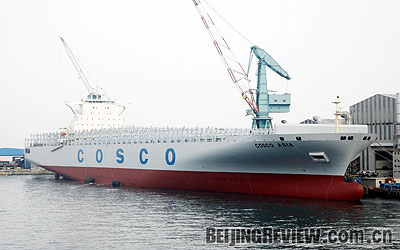|
|

WAY OUT: COSCO, China's largest shipping company, vows to dig a way out of the current shipping downturn through a series of self-rescue measures (By LI ZHENGYU) |
Global shippers are experiencing some aches and pains as the global economic washout is sending a chill throughout the sector. A freefall in demands for the commodities that are their main cargo has led to a severe drop in shipping rates. It appears that the sector's prolonged boom is fading fast, putting investor confidence on the rocks.
The outlook is equally bad for Chinese shippers. But even so, the shipping conglomerate China Ocean Shipping Group Co. (COSCO) has not changed course with its overseas expansion plans.
COSCO Pacific, a Hong Kong-and Shanghai-listed container unit of the parent company, announced on November 26 that it had signed a 4.3-billion-euro ($5.4 billion) deal with Greece to manage and upgrade facilities at the Piraeus Port for up to 35 years, marking the biggest foreign direct investment of Greece to date.
According to the deal, COSCO would expand an existing terminal at Piraeus and finish building a new one by 2014 to help triple the port's capacity to more than 3 million TEUs (20-foot equivalent unit, or a unit of measurement equivalent to one 20-foot container) annually.
The deal is expected to expedite COSCO's foray into Europe as Piraeus is widely seen as a strategically important port. Containers could be transferred there to smaller ships that can navigate the winding Bosphorus Strait to serve ports in southeast European countries such as Romania and Georgia, according to a report in the Financial Times.
Meanwhile, some analysts interpret the move as an effort by COSCO to diversify its profit sources and in turn offset the growing slack in the shipping sector. Port investments, usually long-term and low-risk, are traditionally reasonable options during downturns in the shipping industry, they said.
"It is impossible that the financial storm will rage on for 35 years," Wei Jiafu, COSCO's president, said in a printed statement. "In 35 years, we are confident that we will make a considerable return on this investment."
Previously, COSCO had obtained stakes in a batch of ports in Singapore, Antwerp, Belgium, and the Suez Canal in Egypt, and now operates more than 600 modern vessels worldwide.
Risky business
The company's risk-averse tactics come at a time when the financial contagion is eating into demands for raw materials and consumer goods and causing global seaborne trade to decline to a trickle. On the contrary, the shipping capacity of the sector, as a result of a shipbuilding spree a few years ago, has increased and is now a factor that further weighs against shippers.
According to data of Thomson Reuters, the Baltic Dry Index (BDI), a measure of freight costs for dry bulk goods such as iron ore and grains, has plummeted more than 90 percent from its peak seen this May, typical of a shipping downturn.
Sun Liping, a senior analyst at Guotai Junan Securities Co. Ltd., said that the global shipping sector has followed the world economy into a downward cycle. The boom times would not return until the economy rebounded, she added.
Amid uncertainties hanging over the global shipping sector, COSCO largely held up in the first quarter of this year with the help of buoyant domestic demands. The company earlier announced that it had posted seaborne traffic of 334 million tons by October 10, almost its prescribed target for the whole year.
| 